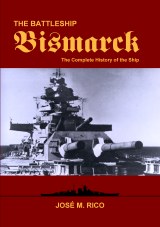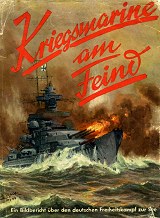 |
Home Intro Technical History Crew Models Gallery Kriegsmarine Archives
More Forum  UPDATES UPDATES |
Seekriegsleitung
Conference of the Commander in Chief, Navy, with the Führer on 14 October 1940, at 1600.
| Present: |
Chief of the OKW [Generalfeldmarschall Keitel] General Jodl Fregattenkapitän von Puttkamer |
1. Survey of the Situation:
a. North Sea and Baltic Sea: The situation remains unchanged. As before, lively traffic consisting of patrols, convoys, and single vessels is observed on the east coast of England, including the Thames. The effect of aerial mines is beginning to become evident. It is necessary to increase use of aerial mines, since large convoys are still reaching the Thames and ports on the east and west coasts. Bombing of the harbors alone is obviously not sufficient. The Führer has authorized the Commander in Chief, Luftwaffe [Ob.d.L], to use the old aerial mines on London again on nights when there is a full moon, but also to drop at least 50 to 60 aerial mines per night off the harbors, first of all on the east coast.
The operation by British destroyers against the Norwegian coast last night led to the loss of two net ships and shows that the enemy is trying to disrupt our traffic in Norwegian waters, making use of the longer nights. Appropriate defense measures have been introduced. In order to eliminate surprise attacks, increased air reconnaissance before dark is urgently necessary during the period of long nights.
b. Channel: Continual forays are being made by torpedo boats and S-boats. Successful attack by the 5th Torpedo Boat Flotilla led to the destruction of two enemy anti-submarine vessels and two coastal vessels, as well as probable damage to a destroyer. During the operation of the S-boats, one boat, S37, was lost. The enemy is continuing lively air attacks against Channel harbors and the Atlantic coast at Brest and Lorient.
c. Submarine Warfare: Recent sinkings and their effects have been particularly gratifying in spite of the fact that bad weather is hampering operations.
Increasing successes by Italian submarines in the Atlantic are anticipated from operations now scheduled to begin.
The complaint by Marshal Badoglio regarding the use of Italian submarines is unjustified, since the boats coming from the Mediterranean receive very strict operational orders from the Italian Admiralty. The Commander in Chief, U-boats [B.d.U], has no control over them until they arrive in Bordeaux.
d. Auxiliary Cruisers: Their operations continue to show very good results. Ship "21" [Widder], commanded by von Ruckteschell, was particularly successful in the North Atlantic, having sunk over 60,000 tons. She is now no longer fit for operations, as the engines need overhauling, and is therefore returning to the French Atlantic coast.
Ship "10" [Thor], commanded by Kähler, has reported regarding an engagement with the ALCANTARA. The commanding officer handled the situation very correctly. Tanker REKUM has returned after successfully refueling three auxiliary cruisers in the North and South Atlantic. The achievement of this vessel gives an indication of the possibilities of refueling auxiliary cruisers and the prospects for our merchant shipping in the Atlantic.
2. Relaxation of Readiness for Operation "Seelöwe" has been ordered according to instructions by the OKW. Orders for improving operational facilities given in these instructions have been taken by the Commander in Chief, Navy, to mean that this is to be effected by constant maneuvers, but that new transport vessels in large numbers are not to be ordered, since otherwise the capacity of the shipyards would be occupied to the detriment of the submarine program, etc. The High Command, Navy [OKM], will design an ideal type of motorized ferry and make all necessary preparations so that mass production can be undertaken quickly in case operation "Seelöwe" is carried out in 1941. Locomotive engines will be used. The Führer agrees.
3. Further Plans for Naval Warfare:
a. Atlantic Operations by Cruiser SCHEER: Departure of the SCHEER is planned for 25 October, departure of the supply ship NORDMARK for 20 October. First, the SCHEER is to carry out operations against merchant shipping in the North Atlantic. Operations are planned on the North Atlantic convoy route. Their execution will depend on the enemy situation. Subsequent operations against merchant shipping are intended in the southern part of the North Atlantic and in the South Atlantic.
b. Operations from the French West Coast: Acquisition of strategic bases on the Atlantic coast would afford facilities for offensive operations and would call for definite concentration of our forces. From bases along the French West Coast, destroyers are to attack enemy supplies coming from the south. For this purpose, the full range of the destroyers should be utilized, and emergency refueling stations established in Spanish ports. Operations against ships carrying mine timber from Portugal and ore from Spain are also planned. Apart from this, destroyers are to lay mines in the St. George Channel and Bristol Channel, to be supplemented by large-scale aerial mine laying off harbors and river mouths.
Upon arrival of battleships and cruisers on the Atlantic coast in the course of the winter, extensive operations are planned in the North Atlantic against enemy supply lines as well as for the protection of our own blockade-runners and prizes. It is to be expected that the enemy supply and convoy system will be greatly affected.
c. In the North Sea and the Channel: We must continue to disrupt enemy coastal traffic by torpedo boats and S-boats as well as minelayers, using mines, torpedoes, and guns. Here also naval operations should be supplemented by the use of aerial mines on a large scale. The Führer agrees. He asks whether the Navy could help in transporting troops and materiel in case it should be necessary to occupy the Canary Islands, Azores, or perhaps the Cape Verde Islands. The Commander in Chief, Navy, replies in the affirmative, provided that the transport operation to these places gets under way before the occupation by air, etc. takes place. It would not be possible to occupy the islands first from the air and afterwards bring up reinforcements by ship, for all approaches to the islands will then be patrolled by the enemy. The SCHEER and other battleships could if necessary join in the operations. 8,000 tons of petrol are already on the Azores. The Führer requests that the whole question be investigated and that the necessary preparations be made.
4. The Commander in Chief, Navy, remarks that there is talk of appointing an Undersecretary of Inland Shipping in the Ministry of Transportation, not on the initiative of the Ministry of Transportation, but on instigation from outside. The question to be solved is whether Inland Shipping should preferably be attached to the Railway Office or to the Maritime Shipping Office. The Commander in Chief, Navy requests that such an appointment should be postponed until peace is concluded, since shipping would then have to be organized once and for all. The Navy should be allowed to cooperate in any case. The Chief of the OKW recommends postponement. The Führer agrees and promises that the Navy will be consulted.
countersigned: Assmann

| Home Guestbook Quiz Glossary Help us Weights & Measures Video Credits Links Contact |

